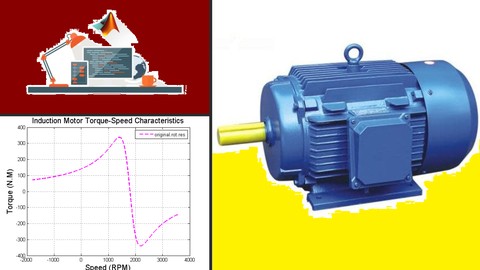
Speed Control Methods of Induction Motors using MATLAB Prog.
Speed Control Methods of Induction Motors using MATLAB Prog., available at $34.99, has an average rating of 3.9, with 45 lectures, based on 28 reviews, and has 897 subscribers.
You will learn about Revise all equations regarding induction motor and its equivalent circuit. Create torque – speed characteristic curve of induction motor. Create current – speed characteristic curve of induction motor. know the principle concept of speed control of induction motor. Create M-Files using MATLAB programming for different methods of speed control. Learn the basics of Variable Speed Drives. This course is ideal for individuals who are This course is suitable for anyone interested in learning about induction motors. or Electrical Engineering Students. or Electrical Engineering Graduates. It is particularly useful for This course is suitable for anyone interested in learning about induction motors. or Electrical Engineering Students. or Electrical Engineering Graduates.
Enroll now: Speed Control Methods of Induction Motors using MATLAB Prog.
Summary
Title: Speed Control Methods of Induction Motors using MATLAB Prog.
Price: $34.99
Average Rating: 3.9
Number of Lectures: 45
Number of Published Lectures: 45
Number of Curriculum Items: 45
Number of Published Curriculum Objects: 45
Original Price: $19.99
Quality Status: approved
Status: Live
What You Will Learn
- Revise all equations regarding induction motor and its equivalent circuit.
- Create torque – speed characteristic curve of induction motor.
- Create current – speed characteristic curve of induction motor.
- know the principle concept of speed control of induction motor.
- Create M-Files using MATLAB programming for different methods of speed control.
- Learn the basics of Variable Speed Drives.
Who Should Attend
- This course is suitable for anyone interested in learning about induction motors.
- Electrical Engineering Students.
- Electrical Engineering Graduates.
Target Audiences
- This course is suitable for anyone interested in learning about induction motors.
- Electrical Engineering Students.
- Electrical Engineering Graduates.
Induction motors are the most widely used electrical motors due to their reliability, low cost, ruggedness and robustness.
However, induction motors do not inherently have the capability of variable speed operation.
The three phase induction motor is a self starting motor. The induction motor has two main parts (stator and rotor).
The speed of the three phase induction motor can be controlled by stator side or rotor side.
This course starts off covering some basic subjects which are needed so that you can understand how speed of induction motor can be varied and controlled.
The course consists of the following sections :-
-
Induction Motor ( Equations & its equivalent circuit).
-
Performance Curve of Induction Motor.
-
Changing number of poles of the motor.
-
Stator Voltage Control Method.
-
Rotor Voltage Control Method.
-
Frequency Control Method.
-
Stator Voltage and Frequency Control Method.
-
Stator Current Control Method.
—
At the end of the course you will :
– Revise all basics of induction motors including equations and circuits.
– Understand all of the fundamentals of speed and torque control of induction motor.
– Revise different methods of speed control of induction motors from both stator and rotor side.
– Getting started with MATLAB Programming.
– How to create its performance curve successfully using MATLAB Programming.
Course Curriculum
Chapter 1: Introduction and Welcome Message
Lecture 1: Introduction
Lecture 2: Why should you take this course?
Chapter 2: Fundamentals of Three Phase Induction Motor
Lecture 1: Important Key Words
Lecture 2: Synchronous Speed & Slip
Lecture 3: Equivalent & Approximate Circuits
Lecture 4: Main Equations of Three Phase Induction Motor
Lecture 5: Torque – Speed Characteristics
Chapter 3: Performance Curve using MATLAB Programming (m.file)
Lecture 1: M.file for Performance Curve of Induction Motor – Part (1)
Lecture 2: M.file for Performance Curve of Induction Motor – Part (2)
Lecture 3: M.file for Performance Curve of Induction Motor – Part (3)
Lecture 4: M.file for Performance Curve of Induction Motor – Part (4)
Lecture 5: M.file for Performance Curve of Induction Motor – Part (5)
Lecture 6: Torque – Speed & Current – Speed Curves
Lecture 7: Find Maximum Torque & Starting Torque – Part (1)
Lecture 8: Find Maximum Torque & Starting Torque – Part (2)
Lecture 9: Motor Coupled with Load
Lecture 10: Finding Full load Current and Starting Current
Chapter 4: Speed Control of Induction Motor
Lecture 1: Methods of Speed Control of Induction Motor
Lecture 2: Pole Changing Method
Lecture 3: M.File of Pole Changing Method – Part (1)
Lecture 4: M.File of Pole Changing Method – Part (2)
Lecture 5: M.File of Pole Changing Method – Part (3)
Chapter 5: Stator Voltage Control Method
Lecture 1: Stator Voltage Method
Lecture 2: M.file of Stator Voltage Control
Lecture 3: Motor Coupled with A Load
Chapter 6: Rotor Voltage Control Method
Lecture 1: Rotor Voltage Control Method
Lecture 2: M.file of Rotor Resistance Method
Lecture 3: Motor Coupled with A Load
Chapter 7: Frequency Control Method
Lecture 1: Basics of Frequency Control
Lecture 2: M.file of Frequency Control – Part (1)
Lecture 3: M.file of Frequency Control – Part (2)
Lecture 4: M.file of Frequency Control – Part (3)
Lecture 5: M.file of Frequency Control – Part (4)
Chapter 8: Stator Voltage & Frequency Control Method
Lecture 1: V/F control
Lecture 2: M.file of VVVF Control – Part (1)
Lecture 3: M.file of VVVF Control – Part (2)
Lecture 4: M.file of VVVF Control – Part (3)
Lecture 5: M.file of VVVF Control – Part (4)
Lecture 6: M.file of VVVF Control – Part (5)
Chapter 9: Stator Current Control Method
Lecture 1: Basics of Stator Current Control
Lecture 2: M.file of Stator current Control – Part (1)
Lecture 3: M.file of Stator current Control – Part (2)
Lecture 4: M.file of Stator current Control – Part (3)
Lecture 5: M.file of Stator current Control – Part (4)
Chapter 10: Course Conclusion
Lecture 1: Course Conclusion
Instructors
-
Mostafa Salama
Electrical Project Engineer at EPS
Rating Distribution
- 1 stars: 2 votes
- 2 stars: 4 votes
- 3 stars: 5 votes
- 4 stars: 9 votes
- 5 stars: 8 votes
Frequently Asked Questions
How long do I have access to the course materials?
You can view and review the lecture materials indefinitely, like an on-demand channel.
Can I take my courses with me wherever I go?
Definitely! If you have an internet connection, courses on Udemy are available on any device at any time. If you don’t have an internet connection, some instructors also let their students download course lectures. That’s up to the instructor though, so make sure you get on their good side!
You may also like
- Top 10 Content Creation Courses to Learn in December 2024
- Top 10 Game Development Courses to Learn in December 2024
- Top 10 Software Testing Courses to Learn in December 2024
- Top 10 Big Data Courses to Learn in December 2024
- Top 10 Internet Of Things Courses to Learn in December 2024
- Top 10 Quantum Computing Courses to Learn in December 2024
- Top 10 Cloud Computing Courses to Learn in December 2024
- Top 10 3d Modeling Courses to Learn in December 2024
- Top 10 Mobile App Development Courses to Learn in December 2024
- Top 10 Graphic Design Courses to Learn in December 2024
- Top 10 Videography Courses to Learn in December 2024
- Top 10 Photography Courses to Learn in December 2024
- Top 10 Language Learning Courses to Learn in December 2024
- Top 10 Product Management Courses to Learn in December 2024
- Top 10 Investing Courses to Learn in December 2024
- Top 10 Personal Finance Courses to Learn in December 2024
- Top 10 Health And Wellness Courses to Learn in December 2024
- Top 10 Chatgpt And Ai Tools Courses to Learn in December 2024
- Top 10 Virtual Reality Courses to Learn in December 2024
- Top 10 Augmented Reality Courses to Learn in December 2024






















